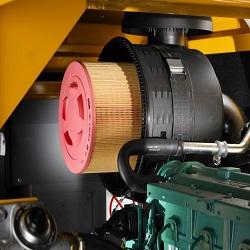AIR COMPRESSOR:
An air compressor is a pneumatic device that converts power (using an electric motor, diesel or gasoline engine, etc.) into potential energy stored in pressurized air (i.e., compressed air). By one of several methods, an air compressor forces more and more air into a storage tank, increasing the pressure. When the tank’s pressure reaches its engineered upper limit, the air compressor shuts off. The compressed air, then, is held in the tank until called into use.The energy contained in the compressed air can be used for a variety of applications, utilizing the kinetic energy of the air as it is released and the tank depressurizes. When tank pressure reaches its lower limit, the air compressor turns on again and re-pressurizes the tank. An air Compressor must be differentiated from a pump because it works for any gas/air, while pumps work on a liquid.

APPLICATIONS:
Air compressors have many uses, including: supplying high-pressure clean air to fill gas cylinders, supplying moderate-pressure clean air to a submerged surface supplied diver, supplying moderate-pressure clean air for driving some office and school building pneumatic HVAC control system valves, supplying a large amount of moderate-pressure air to power pneumatic tools, such as jackhammers, filling high pressure air tanks (HPA), for filling tires, and to produce large volumes of moderate-pressure air for large-scale industrial processes (such as oxidation for petroleum coking or cement plant bag house purge systems).. The oil-less system also delivers air of better quality.Air compressors are designed to utilize a variety of power sources. While gas/diesel-powered and electric air compressors are among the most popular, air compressors that utilize vehicle engines, power-take-off, or hydraulic ports are also commonly used in mobile applications.The power of a compressor is measured in HP (horsepower) and CFM (cubic feet per minute of intake air). The gallon size of the tank specifies the volume of compressed air (in reserve) available. Gas/diesel powered compressors are widely used in remote areas with problematic access to electricity. They are noisy and require ventilation for exhaust gases. Electric powered compressors are widely used in production, workshops and garages with permanent access to electricity. Common workshop/garage compressors are 110-120 Volt or 230-240 Volt. Compressor tank shapes are: “pancake”, “twin tank”, “horizontal”, and “vertical”. Depending on a size and purpose compressors can be stationary or portable.
ADVANTAGES OF AIR COMPRESSOR:
Our air compressor is capable of so much more than spray-painting, cleaning and tyre-inflating tasks. Armed with the appropriate air tools a standard air compressor can undertake a vast range of domestic and industrial chores including professional drilling, sanding, polishing, sawing, hammering, grinding and plenty more besides.Not only that, but air tools provide a number of significant advantages over traditional electrically powered tools. Here are the top 4 advantagfes of using compressed air tools over conventional power tools.
1.Air tools are easier to use:
Since air tools are powered by compressed air supplied by an external air compressor they don’t require their own heavy internal motor. Consequently, air tools tend to be more compact, lighter and ergonomically designed than normal power tools which means they can be used for longer without the operator experiencing fatigue. A more compact design also means that air tools are often suited for use in confined spaces where a bulkier conventional tool wouldn’t fit.
2.Air tools are more reliable:
Air tools generally contain far fewer moving parts than electrically-powered tools which means that there is less to go wrong with them and they require minimal maintenance. Air tools are saferThe absence of an electrically powered motor in air tools means that the risk of the operator receiving an electrical shock from a malfunctioning tool is eliminated. Air tools are also safer to use in environments where combustive gases may be present in the atmosphere or in situations where the presence of water, damp or water vapour might prohibit the use of an electrical tool.
3.Air tools are economical:
Particularly when used continuously in a commercial or industrial environment, air tools consume far less electricity than their mains-operated counterparts. In some applications, such as where high degrees of torque are required to tighten or loosen a fitting, air tools are also more powerful. Air tools typically cost less to purchase or replace than conventional power tools, and a further financial benefit of air tools is that they are less attractive to thieves than standard power tools.
4.Air tools increase productivity
Thanks to their versatility, power and ease of use air tools allow the completion of complex tasks more quickly than when using conventional power tools, because swapping one air tool for another is so quick and easy. Thus, for example, sanding, nailing down and spray painting an area of garden decking can be done with maximum speed and efficiency by using the appropriate air tools.


